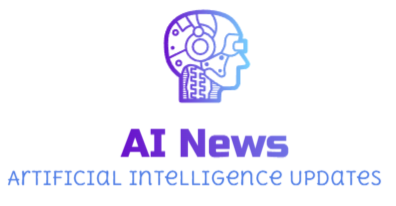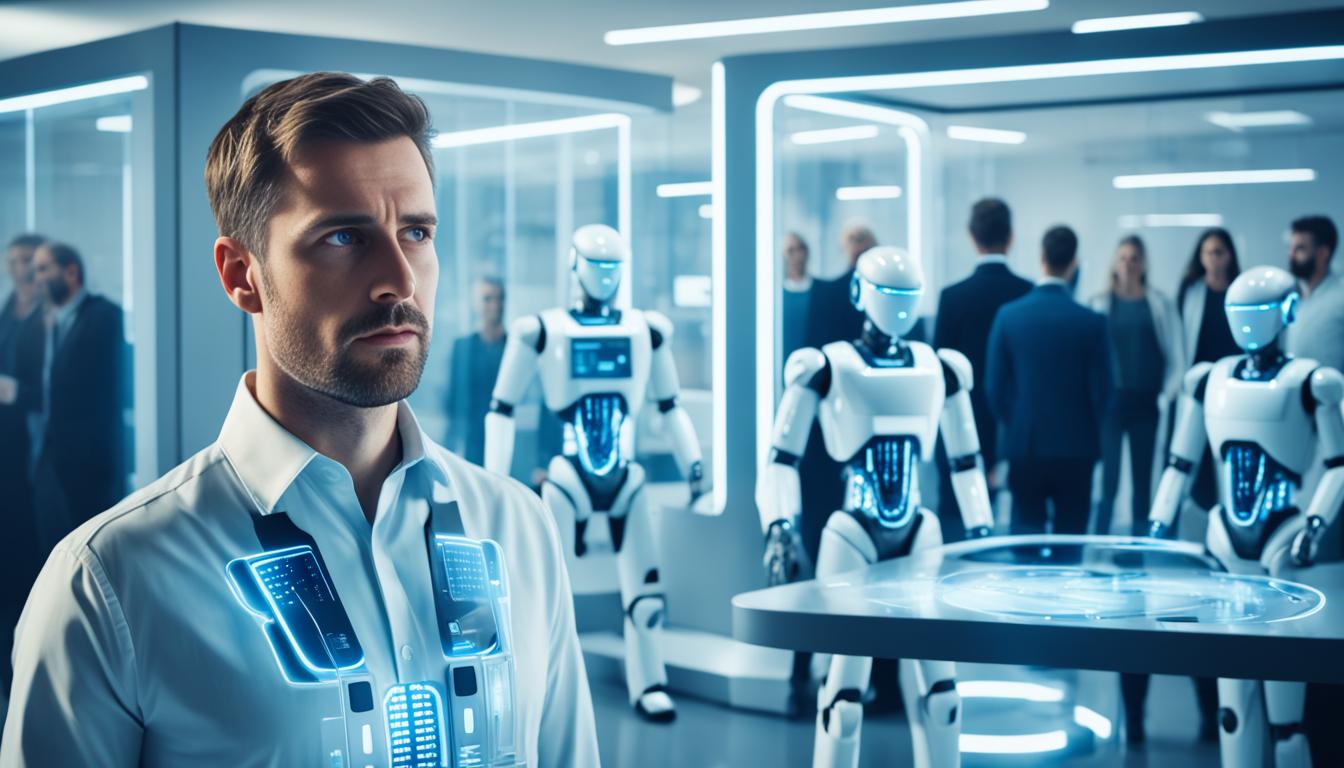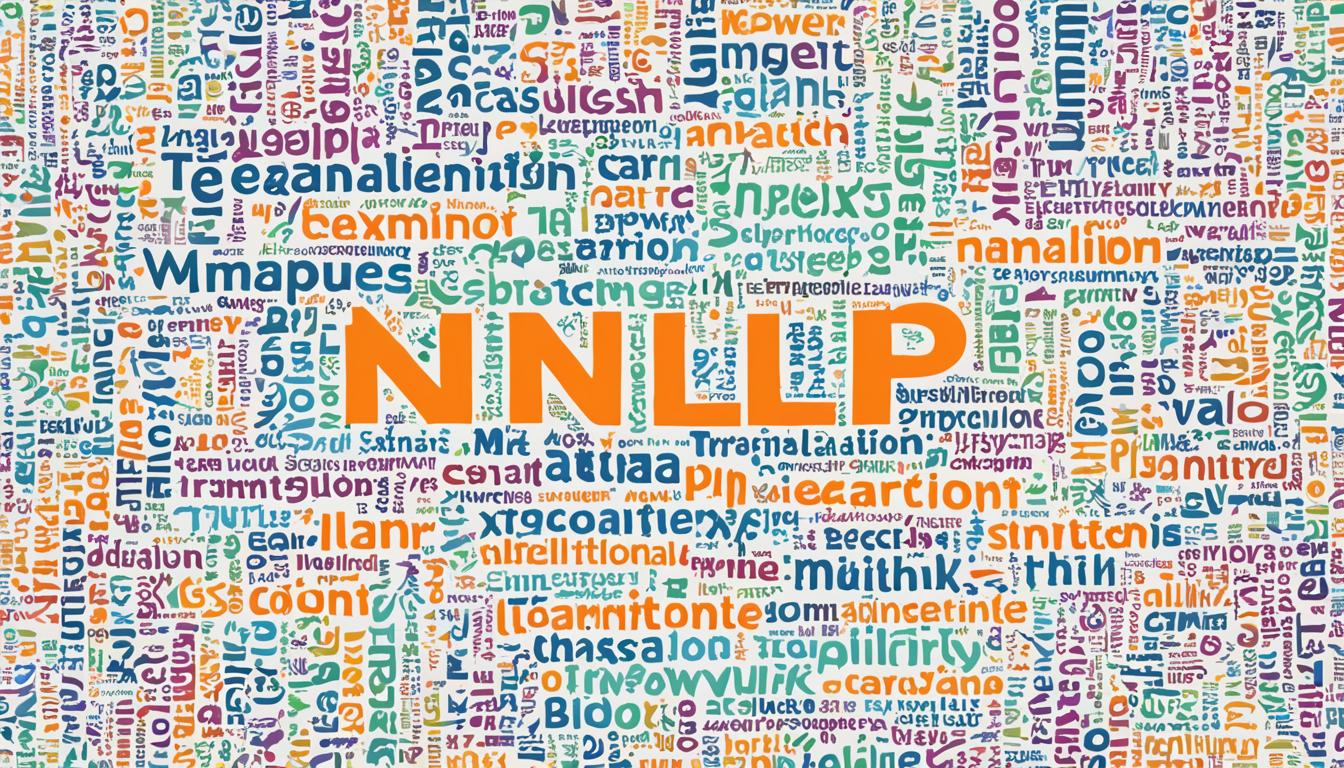The job market is changing fast, thanks to artificial intelligence (AI) and automation. These technologies are changing old industries. The skills needed for the future are changing too. This article will look at how AI affects jobs, what skills will be needed, and which careers will do well with AI.
Key Takeaways
- The rise of AI and automation is reshaping the job market, creating both challenges and opportunities.
- Critical thinking, problem-solving, creativity, and innovation will be highly sought-after skills in the future workforce.
- Tech-related roles and human-centric professions are expected to be valuable careers in the age of AI.
- Embracing lifelong learning and the human-AI partnership will be crucial for thriving in the AI-driven economy.
- Responsible AI development and addressing bias and fairness are key ethical considerations in job automation.
Understanding the Impact of AI on Job Automation
AI has changed the job market fast, making automation more common in many industries. AI systems now do many tasks better and faster than people, changing how we work.
The Rise of Artificial Intelligence
AI grew thanks to big steps in machine learning, understanding language, and seeing images. These advances let AI look at lots of data, spot patterns, and make choices on its own. Now, AI helps in many areas, like making things, moving goods, and doing office work.
Industries Affected by Automation
AI job automation hits hard in manufacturing, transport, and office jobs. In manufacturing, AI robots and systems have taken over many jobs, making things faster and using less human labor. Transport is also changing with self-driving cars, which could change jobs for drivers.
Office tasks like typing, bookkeeping, and helping customers are now done by AI chatbots and virtual assistants. These tools work fast, accurately, and consistently, making some human jobs less needed.
The AI impact on jobs is clear, and it will keep growing. As AI gets better, more jobs will change. Companies and leaders need to plan for this change to help workers adjust and succeed in an AI world.
AI Job Automation: Threat or Opportunity?
The rise of artificial intelligence (AI) in the workforce has sparked a debate. Is AI job automation a threat or an opportunity for the future of work? As AI takes over more tasks and roles, concerns about losing human jobs are valid. But, looking closer shows the impact of AI job automation might be more complex than just a threat.
Some jobs, like those in manufacturing, transportation, and admin work, could be at risk from automation. This could cause economic problems and worry people about their jobs. AI job automation might change traditional careers and make it hard for some to find new jobs.
But, AI also brings new chances for workers. It can handle simple, repetitive tasks, letting people do more complex, creative work. This could lead to new jobs that use skills like critical thinking and emotional intelligence. AI job automation might also create jobs for people who work with AI systems, offering new career paths.
The effect of AI job automation will depend on how we handle it. By supporting education and training, we can help workers adjust to new jobs. With the right steps, AI job automation could make the workforce more efficient, productive, and rewarding.
Skills for the Future: Adapting to the AI-Driven Workforce
AI and automation are changing the job market. The skills most valuable in the future are those AI can’t easily do. Workers need new skills to adapt, innovate, and succeed in this new world.
Critical Thinking and Problem-Solving
Thinking critically and solving complex problems is key. In an AI world, workers who can analyze data, spot patterns, and come up with creative solutions are in demand. These skills help workers deal with the challenges of technology changes.
Creativity and Innovation
Creativity and innovation are crucial in the AI-driven workforce. Machines are getting better at doing routine tasks. Workers who can think creatively, come up with new ideas, and innovate will stand out. Employers want people who can bring new ideas and push progress in their fields.
By developing these skills, workers can be ready for the changing AI-driven workforce. They can take advantage of the future skills that will be needed.
Valuable Careers in the Age of AI
The world is changing fast with AI leading the way. Some careers are becoming key players. They use the strengths of humans and machines together. This partnership drives new ideas and progress.
Tech-Related Roles
AI is making tech skills more important than ever. Jobs like data scientists, machine learning engineers, and cybersecurity specialists are in high demand. These tech-related roles need both technical know-how and problem-solving skills. They are vital in the AI-driven economy.
Human-Centric Professions
AI is great at fast, complex tasks, but some jobs need a human touch. Careers in healthcare, education, and social services need empathy and complex decision-making skills. These human-centric professions will always be needed. They show the value of human interaction.
The future is bright for careers that blend human and machine skills. By adapting to AI, people and companies can find new chances for growth and innovation.
AI Job Automation and the Future of Work
AI automation is changing the job market in big ways. It’s not just about certain jobs; it’s changing how we work and what skills we need. This change is big and affects everyone.
AI might take over some jobs, making workers look for new skills. This means we need to be ready to learn new things. Employers and leaders must work together to help everyone adjust to an AI-driven workforce.
Also, AI could make some people richer and others poorer. Those with the right skills might get more benefits from new technology. We need new ways to teach people, train them, and help those who lose their jobs. This will help everyone share in the growth of the economy.
Dealing with the future of work means finding a good balance. We need to move forward with technology but also protect our workers. By investing in people and working together with machines, we can make a future where everyone does well.
Lifelong Learning: Embracing Continuous Education
The world of work is changing fast, thanks to AI and job automation. This makes lifelong learning and continuous education more important than ever. Workers need to keep learning new skills to stay ahead.
Now, having just one career path or set of skills isn’t enough. To succeed in the AI economy, you must always be learning and improving your skills. This means looking for ways to learn more, get new skills, and keep up with changes.
Upskilling and Reskilling
Upskilling means making your current skills better. Reskilling is about learning new skills altogether. Both are key to keeping up with the changing job market.
Whether it’s learning new software, getting into data analysis, or improving your problem-solving skills, being able to upskill and reskill is crucial. It helps you stand out when looking for a secure career.
By always learning and staying educated, workers can adjust to new job market demands. They can also be ready for new opportunities that come with AI and automation.
The Human-AI Partnership: Finding the Right Balance
AI is changing the job world fast. It’s key to balance human skills with AI’s automation. This balance is crucial for better productivity, efficiency, and new ideas at work.
AI is great at analyzing data, spotting patterns, and doing repetitive tasks. But humans have special skills too. They think deeply, solve problems creatively, and understand people’s feelings. This makes them essential in today’s fast-changing work world.
By working together, humans and AI can do amazing things. This partnership is key to reaching our full potential at work.
Finding the right mix of automation and human work is hard. Too much AI can make things feel less personal, lower job satisfaction, and raise ethical questions. Not using AI enough can make a company fall behind.
The goal is to use AI to make humans work better. This lets employees focus on big-picture thinking, creativity, and understanding people. This balance creates a human-AI partnership that leads to more innovation, better productivity, and a happier work life.
Ethical Considerations in AI Job Automation
AI and automation are changing the job market fast. It’s key to look at the ethical sides of these changes. Responsible AI development is vital to make sure AI helps everyone fairly. We need to lessen the bad effects on workers.
Responsible AI Development
AI systems need to follow ethical rules like being clear, accountable, and fair. Developers and those making policies must work together. They should create strong rules for using AI at work. This means checking often to fix any bias and fairness problems.
Addressing Bias and Fairness
AI could bring bias into job decisions. Developers must work hard to stop this unfairness. Using diverse views and regular checks can make AI fair and open to everyone.
Looking at AI job automation needs a wide view. We must think about the workers’ well-being first. By focusing on responsible AI development and fixing bias, we can use technology to make work better for everyone.
Strategies for Thriving in the AI-Driven Economy
The job market is changing fast because of artificial intelligence (AI). To stay ahead, both people and companies need to keep up. The secret is to get skills that won’t go out of date, keep learning, and be open to new ideas.
Skills like critical thinking, solving problems, and being creative are important. These skills can’t be easily replaced by AI. By always learning new things, you’ll stay competitive in the changing job world.
Companies also need to get ready for the AI age. They should support a culture of learning and being flexible. This way, workers can work well with AI. Working together with machines will be crucial. We’ll use the best of both to bring new ideas and success.





